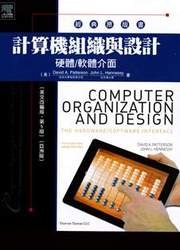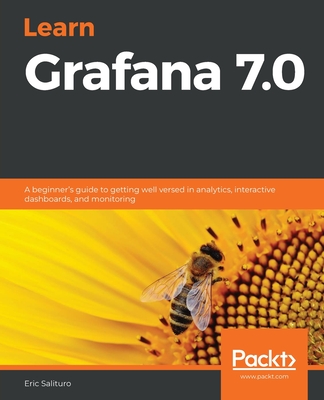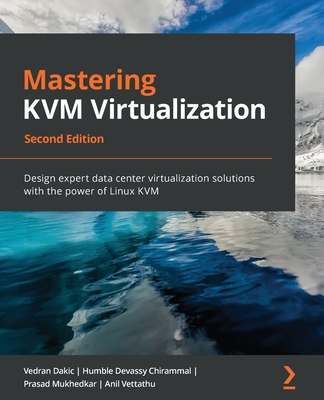Practical LXC and LXD: Linux Containers for Virtualization and Orchestration (Paperback)
暫譯: 實用的 LXC 和 LXD:用於虛擬化和編排的 Linux 容器 (平裝本)
Senthil Kumaran S.
買這商品的人也買了...
-
 $1,421Computer Architecture: A Quantitative Approach, 5/e (Paperback)
$1,421Computer Architecture: A Quantitative Approach, 5/e (Paperback) -
 Perl 學習手冊, 6/e (Learning Perl, 6/e)
Perl 學習手冊, 6/e (Learning Perl, 6/e)$580$458 -
 演算法, 4/e (Algorithms, 4/e)
演算法, 4/e (Algorithms, 4/e)$779$740 -
 $1,617Computer Organization and Design: The Hardware/Software Interface, 5/e (Asian Edition)(IE-Paperback)
$1,617Computer Organization and Design: The Hardware/Software Interface, 5/e (Asian Edition)(IE-Paperback) -
 $352Angular 從零到一
$352Angular 從零到一 -
 $556Angular 權威教程
$556Angular 權威教程 -
 $1,848Usage-Driven Database Design: From Logical Data Modeling through Physical Schema Definition
$1,848Usage-Driven Database Design: From Logical Data Modeling through Physical Schema Definition -
 $449收穫,不止 SQL 優化 — 抓住 SQL 的本質
$449收穫,不止 SQL 優化 — 抓住 SQL 的本質 -
 $265Web API 的設計與開發 (Web API : the Good Parts)
$265Web API 的設計與開發 (Web API : the Good Parts) -
 $352Groovy 程序設計 (Programming Groovy 2: Dynamic Productivity for the Java Developer)
$352Groovy 程序設計 (Programming Groovy 2: Dynamic Productivity for the Java Developer) -
 $393算法設計與分析基礎, 3/e (Introduction to the Design and Analysis of Algorithms, 3/e)
$393算法設計與分析基礎, 3/e (Introduction to the Design and Analysis of Algorithms, 3/e) -
 從零開始學架構:照著做,你也能成為架構師
從零開始學架構:照著做,你也能成為架構師$594$564 -
 KVM 實戰:原理、進階與性能調優
KVM 實戰:原理、進階與性能調優$534$507 -
 Python 最強入門邁向頂尖高手之路 -- 王者歸來 (全彩版)
Python 最強入門邁向頂尖高手之路 -- 王者歸來 (全彩版)$1,000$790 -
 $454精通 Tableau 商業數據分析與可視化
$454精通 Tableau 商業數據分析與可視化 -
 Learn Grafana 7.0: A beginner's guide to getting well versed in analytics, interactive dashboards, and monitoring
Learn Grafana 7.0: A beginner's guide to getting well versed in analytics, interactive dashboards, and monitoring$2,710$2,575 -
 QEMU/KVM 源碼解析與應用
QEMU/KVM 源碼解析與應用$1,008$958 -
 $3,192The Algorithm Design Manual, 3/e (Hardcover)
$3,192The Algorithm Design Manual, 3/e (Hardcover) -
 $653分佈式製造系統智能協調控制理論與模型
$653分佈式製造系統智能協調控制理論與模型 -
 統計學習要素:機器學習中的數據挖掘、推斷與預測, 2/e (The Elements of Statistical Learning: Data Mining, Inference, and Prediction, 2/e)
統計學習要素:機器學習中的數據挖掘、推斷與預測, 2/e (The Elements of Statistical Learning: Data Mining, Inference, and Prediction, 2/e)$954$906 -
 Enterprise Application Development with C# 9 and .NET 5: Enhance your C# and .NET skills by mastering the process of developing professional-grade web
Enterprise Application Development with C# 9 and .NET 5: Enhance your C# and .NET skills by mastering the process of developing professional-grade web$1,600$1,520 -
 白話演算法!培養程式設計的邏輯思考 (Grokking Algorithms: An illustrated guide for programmers and other curious people)
白話演算法!培養程式設計的邏輯思考 (Grokking Algorithms: An illustrated guide for programmers and other curious people)$520$468 -
 Jira 實戰:項目管理與精益看板
Jira 實戰:項目管理與精益看板$534$507 -
 Learning eBPF: Programming the Linux Kernel for Enhanced Observability, Networking, and Security (Paperback)
Learning eBPF: Programming the Linux Kernel for Enhanced Observability, Networking, and Security (Paperback)$1,862$1,764 -
 原子嵌入式 Linux 驅動開發詳解與實戰 (ARM Linux 驅動)
原子嵌入式 Linux 驅動開發詳解與實戰 (ARM Linux 驅動)$1,068$1,015
商品描述
Use Linux containers as an alternative virtualization technique to virtualize your operating system environment. This book will cover LXC’s unmatched flexibility with virtualization and LXD’s smooth user experience.
Practical LXC and LXD begins by introducing you to Linux containers (LXC and LXD). You will then go through use cases based on LXC and LXD. Next, you will see the internal workings of LXC and LXD by considering the repositories and templates used. You will then learn how to integrate LXC and LXD with common virtualization and orchestration tools such as libvirt and SaltStack. Finally, you will dive into containerization and security. The book will explore some of the common problems in security and provide a case study on how containerization can help mitigate some of the operating system-level security issues in an IoT environment.
What You Will Learn
- Get an introduction to Linux containers
- Discover the basics of LXC and LXD
- See use cases that can be solved with LXC and LXD – for developers, devops, and system administrators
- Master LXC and LXD repositories
- Use LXC and LXD with common virtualization and orchestration tools
- Consider a containerization and security in IoT case study
Who This Book Is For
The audience for this book should have basic knowledge of Linux and software development in general. The intended readership is primarily software developers, operations engineers, and system administrators who are interested in devops, though managers and enthusiasts will also benefit from this book.
商品描述(中文翻譯)
使用 Linux 容器作為虛擬化技術的替代方案,以虛擬化您的操作系統環境。本書將涵蓋 LXC 在虛擬化方面無與倫比的靈活性以及 LXD 的流暢用戶體驗。
《實用 LXC 和 LXD》首先介紹 Linux 容器(LXC 和 LXD)。接著,您將通過基於 LXC 和 LXD 的使用案例進行學習。然後,您將了解 LXC 和 LXD 的內部運作,考慮所使用的儲存庫和模板。接下來,您將學習如何將 LXC 和 LXD 與常見的虛擬化和編排工具(如 libvirt 和 SaltStack)整合。最後,您將深入探討容器化和安全性。本書將探討一些安全性中的常見問題,並提供一個案例研究,說明容器化如何幫助減輕 IoT 環境中的某些操作系統級安全問題。
您將學到的內容:
- 獲得 Linux 容器的介紹
- 探索 LXC 和 LXD 的基本概念
- 查看可以用 LXC 和 LXD 解決的使用案例 - 針對開發人員、DevOps 和系統管理員
- 精通 LXC 和 LXD 儲存庫
- 使用 LXC 和 LXD 與常見的虛擬化和編排工具
- 考慮 IoT 案例研究中的容器化和安全性
本書的讀者對象應具備基本的 Linux 知識和一般軟體開發知識。目標讀者主要是對 DevOps 感興趣的軟體開發人員、運營工程師和系統管理員,雖然經理和愛好者也將從本書中受益。











